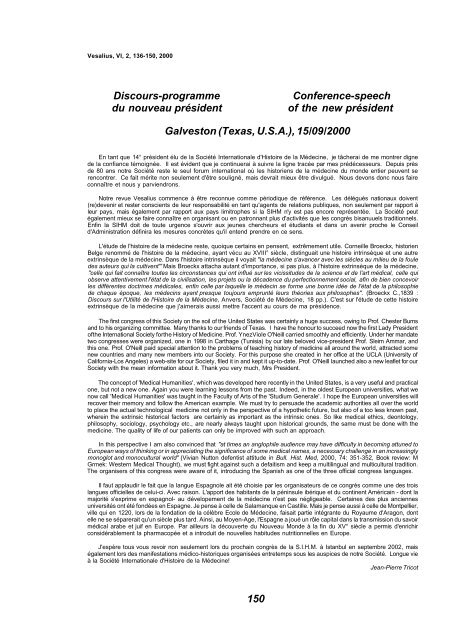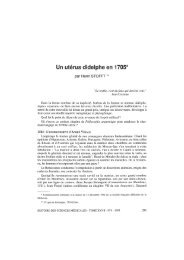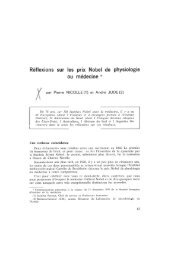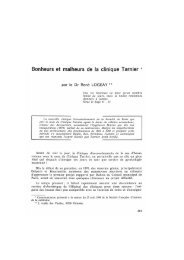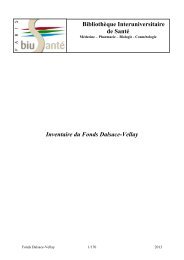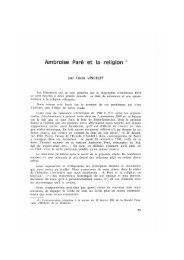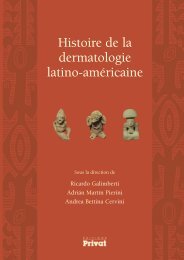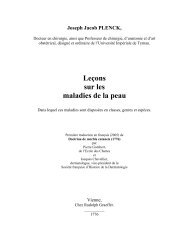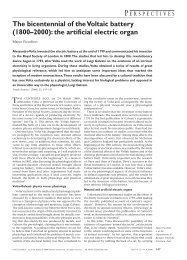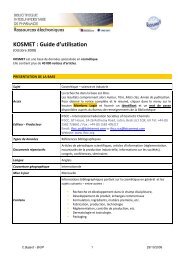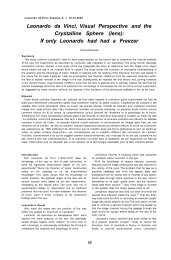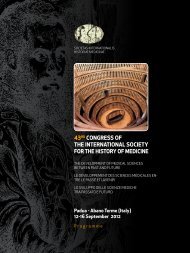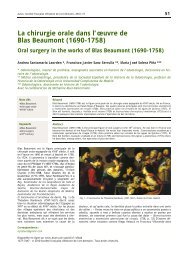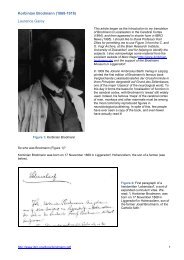Official journal of the International Society Revue officielle de la ...
Official journal of the International Society Revue officielle de la ...
Official journal of the International Society Revue officielle de la ...
You also want an ePaper? Increase the reach of your titles
YUMPU automatically turns print PDFs into web optimized ePapers that Google loves.
Vesalius, VI, 2, 136-150, 2000Discours-programmedu nouveau prési<strong>de</strong>ntConference-speech<strong>of</strong> <strong>the</strong> new prési<strong>de</strong>ntGalveston (Texas, U.S.A.), 15/09/2000En tant que 14° prési<strong>de</strong>nt élu <strong>de</strong> <strong>la</strong> Société <strong>International</strong>e d'Histoire <strong>de</strong> <strong>la</strong> Mé<strong>de</strong>cine, je tâcherai <strong>de</strong> me montrer digne<strong>de</strong> <strong>la</strong> confiance témoignée. Il est évi<strong>de</strong>nt que je continuerai à suivre <strong>la</strong> ligne tracée par mes prédécesseurs. Depuis près<strong>de</strong> 80 ans notre Société reste le seul forum international où les historiens <strong>de</strong> <strong>la</strong> mé<strong>de</strong>cine du mon<strong>de</strong> entier peuvent serencontrer. Ce fait mérite non seulement d'être souligné, mais <strong>de</strong>vrait mieux être divulgué. Nous <strong>de</strong>vons donc nous faireconnaître et nous y parviendrons.Notre revue Vesalius commence à être reconnue comme périodique <strong>de</strong> référence. Les délégués nationaux doivent(re)<strong>de</strong>venir et rester conscients <strong>de</strong> leur responsabilité en tant qu'agents <strong>de</strong> re<strong>la</strong>tions publiques, non seulement par rapport àleur pays, mais également par rapport aux pays limitrophes si <strong>la</strong> SIHM n'y est pas encore représentée. La Société peutégalement mieux se faire connaître en organisant ou en patronnant plus d'activités que les congrès bisanuuels traditionnels.Enfin <strong>la</strong> SIHM doit <strong>de</strong> toute urgence s'ouvrir aux jeunes chercheurs et étudiants et dans un avenir proche le Conseild'Administration définira les mesures concrètes qu'il entend prendre en ce sens.L'étu<strong>de</strong> <strong>de</strong> l'histoire <strong>de</strong> <strong>la</strong> mé<strong>de</strong>cine reste, quoique certains en pensent, extrêmement utile. Corneille Broeckx, historienBelge renommé <strong>de</strong> l'histoire <strong>de</strong> <strong>la</strong> mé<strong>de</strong>cine, ayant vécu au XVIII° siècle, distinguait une histoire intrinsèque et une autreextrinsèque <strong>de</strong> <strong>la</strong> mé<strong>de</strong>cine. Dans l'histoire intrinsèque il voyait "<strong>la</strong> mé<strong>de</strong>cine s'avancer avec les siècles au milieu <strong>de</strong> <strong>la</strong> foule<strong>de</strong>s auteurs qui <strong>la</strong> cultivent'" Mais Broeckx attacha autant d'importance, si pas plus, à l'histoire extrinsèque <strong>de</strong> <strong>la</strong> mé<strong>de</strong>cine,"celle qui fait connaître toutes les circonstances qui ont influé sur les vicissitu<strong>de</strong>s <strong>de</strong> <strong>la</strong> science et <strong>de</strong> l'art médical, celle quiobserve attentivement l'état <strong>de</strong> <strong>la</strong> civilisation, les projets ou <strong>la</strong> déca<strong>de</strong>nce du perfectionnement social, afin <strong>de</strong> bien concevoirles différentes doctrines médicales, enfin celle par <strong>la</strong>quelle le mé<strong>de</strong>cin se forme une bonne idée <strong>de</strong> l'état <strong>de</strong> <strong>la</strong> philosophie<strong>de</strong> chaque époque, les mé<strong>de</strong>cins ayant presque toujours emprunté leurs théories aux philosophes". (Broeckx C.,1839 :Discours sur l'Utilité <strong>de</strong> l'Histoire <strong>de</strong> <strong>la</strong> Mé<strong>de</strong>cine, Anvers, Société <strong>de</strong> Mé<strong>de</strong>cine, 18 pp.). C'est sur l'étu<strong>de</strong> <strong>de</strong> cette histoireextrinsèque <strong>de</strong> <strong>la</strong> mé<strong>de</strong>cine que j'aimerais aussi mettre l'accent au cours <strong>de</strong> ma prési<strong>de</strong>nce.The first congress <strong>of</strong> this <strong>Society</strong> on <strong>the</strong> soil <strong>of</strong> <strong>the</strong> United States was certainly a huge success, owing to Pr<strong>of</strong>. Chester Bumsand to his organizing committee. Many thanks to our friends <strong>of</strong> Texas. I have <strong>the</strong> honour to succeed now <strong>the</strong> first Lady Presi<strong>de</strong>nt<strong>of</strong><strong>the</strong> <strong>International</strong> <strong>Society</strong> for<strong>the</strong> History <strong>of</strong> Medicine. Pr<strong>of</strong>. YnezViole O'Neill carried smoothly and efficiently. Un<strong>de</strong>r her mandatetwo congresses were organized, one in 1998 in Carthage (Tunisia) by our <strong>la</strong>te beloved vice-presi<strong>de</strong>nt Pr<strong>of</strong>. Sleim Ammar, andthis one. Pr<strong>of</strong>. O'Neill paid special attention to <strong>the</strong> problems <strong>of</strong> teaching history <strong>of</strong> medicine all around <strong>the</strong> world, attracted somenew countries and many new members into our <strong>Society</strong>. For this purpose she created in her <strong>of</strong>fice at <strong>the</strong> UCLA (University <strong>of</strong>California-Los Angeles) a web-site for our <strong>Society</strong>, filed it in and kept it up-to-date. Pr<strong>of</strong>. O'Neill <strong>la</strong>unched also a new leaflet for our<strong>Society</strong> with <strong>the</strong> mean information about it. Thank you very much, Mrs Presi<strong>de</strong>nt.The concept <strong>of</strong> 'Medical Humanities', which was <strong>de</strong>veloped here recently in <strong>the</strong> United States, is a very useful and practicalone, but not a new one. Again you were learning lessons from <strong>the</strong> past. In<strong>de</strong>ed, in <strong>the</strong> ol<strong>de</strong>st European universities, what wenow call 'Medical Humanities' was taught in <strong>the</strong> Faculty <strong>of</strong> Arts <strong>of</strong> <strong>the</strong> 'Studium Generale'. I hope <strong>the</strong> European universities willrecover <strong>the</strong>ir memory and follow <strong>the</strong> American example. We must try to persua<strong>de</strong> <strong>the</strong> aca<strong>de</strong>mic authorities all over <strong>the</strong> worldto p<strong>la</strong>ce <strong>the</strong> actual technological medicine not only in <strong>the</strong> perspective <strong>of</strong> a hypo<strong>the</strong>tic future, but also <strong>of</strong> a too less known past,wherein <strong>the</strong> extrinsic historical factors are certainly as important as <strong>the</strong> intrinsic ones. So like medical ethics, <strong>de</strong>ontology,philosophy, sociology, psychology etc., are nearly always taught upon historical grounds, <strong>the</strong> same must be done with <strong>the</strong>medicine. The quality <strong>of</strong> life <strong>of</strong> our patients can only be improved with such an approach.In this perspective I am also convinced that "at times an anglophile audience may have difficulty in becoming attuned toEuropean ways <strong>of</strong> thinking or in appreciating <strong>the</strong> significance <strong>of</strong> some medical names, a necessary challenge in an increasinglymonoglot and monocultural world" (Vivian Nutton <strong>de</strong>fentist attitu<strong>de</strong> in Bull. Hist. Med, 2000, 74: 351-352, Book review: MGrmek: Western Medical Thought), we must fight against such a <strong>de</strong>faitism and keep a multilingual and multicultural tradition.The organisers <strong>of</strong> this congress were aware <strong>of</strong> it, introducing <strong>the</strong> Spanish as one <strong>of</strong> <strong>the</strong> three <strong>of</strong>ficial congress <strong>la</strong>nguages.Il faut app<strong>la</strong>udir le fait que <strong>la</strong> <strong>la</strong>ngue Espagnole ait été choisie par les organisateurs <strong>de</strong> ce congrès comme une <strong>de</strong>s trois<strong>la</strong>ngues <strong>of</strong>ficielles <strong>de</strong> celui-ci. Avec raison. L'apport <strong>de</strong>s habitants <strong>de</strong> <strong>la</strong> péninsule ibérique et du continent Américain - dont <strong>la</strong>majorité s'exprime en espagnol- au dévelopement <strong>de</strong> <strong>la</strong> mé<strong>de</strong>cine n'est pas négligeable. Certaines <strong>de</strong>s plus anciennesuniversités ont été fondées en Espagne. Je pense à celle <strong>de</strong> Sa<strong>la</strong>manque en Castille. Mais je pense aussi à celle <strong>de</strong> Montpellier,ville qui en 1220, lors <strong>de</strong> <strong>la</strong> fondation <strong>de</strong> <strong>la</strong> célèbre Ecole <strong>de</strong> Mé<strong>de</strong>cine, faisait partie intégrante du Royaume d'Aragon, dontelle ne se séparerait qu'un siècle plus tard. Ainsi, au Moyen-Age, l'Espagne a joué un rôle capital dans <strong>la</strong> transmission du savoirmédical arabe et juif en Europe. Par ailleurs <strong>la</strong> découverte du Nouveau Mon<strong>de</strong> à <strong>la</strong> fin du XV° siècle a permis d'enrichirconsidérablement <strong>la</strong> pharmacopée et a introduit <strong>de</strong> nouvelles habitu<strong>de</strong>s nutritionnelles en Europe.J'espère tous vous revoir non seulement lors du prochain congrès <strong>de</strong> <strong>la</strong> S.I.H.M. à Istanbul en septembre 2002, maiségalement lors <strong>de</strong>s manifestations médico-historiques organisées entretemps sous les auspices <strong>de</strong> notre Société. Longue vieà <strong>la</strong> Société <strong>International</strong>e d'Histoire <strong>de</strong> <strong>la</strong> Mé<strong>de</strong>cine!Jean-Pierre Tricot150


